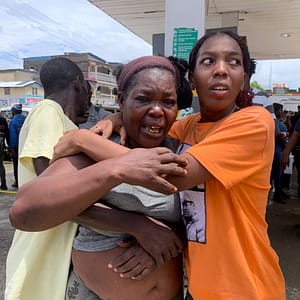-By Jodel Coupet, lawyer
Since the heinous assassination of the former Haitian president, Jovenel Moise in his private residence on the night of July 6 to 7, 2021, Haiti has fallen into a spiral of unprecedented political and institutional crises.
First, the appointment on July 5, 2021 in special monitor #36-B of citizen Ariel Henry, a few hours before the assassination of the president, followed by his installation the following week which lasted two (02) years eight (08 ) months without having done anything about its mission of restoring national security and the organization of general elections, despite the political consensuses remaining stillborn (Montana Agreement of August 30, 2021, Agreement of December 21, 2022, etc.) concluded with political actors and parties; then the potential territorial expansion of dangerous gangs defying public forces; finally the adventures of an International Community in bringing in a multinational force with an African component to come and deal with the problem of insecurity in Haiti which is now taking dangerous proportions of terrorism.
Held abroad since March 12, Prime Minister Henry, now resigned, is waiting to ratify the formation of a well-crafted, multi-headed Presidential Council (CP) under the obedience of an International Community in Caribbean leadership mode, they say. respond to the country’s various political, institutional and, above all, security crises. While the resigned government is in its umpteenth declaration of a state of siege in the capital of Port-au-Prince and surrounding areas since the armed attacks by gangs against aviation, public and private establishments, the country is plunging into institutional chaos and an indescribable humanitarian crisis translated by the total defeat of State authority in the face of armed groups who impose their laws in the neighborhoods, towns, municipalities and even departments of the country.
Today we are working hard to ensure that the panacea concocted for Haiti’s various ills is ready. The international community has thus succeeded in a master stroke by awarding in one fell swoop, in a single stroke, but in defiance of the law and the constitution, positions of president to Haitian degenerates viscerally suffering from the disease of power, while the urgency of acting to save a population from the terror of gangs has become the least of the concerns of national and international actors engaged in the talks leading to the formation of the CP in a Haiti placed red in the list of dangerous territories to avoid around the world due to the level of extreme violence committed by armed gangs against civilian populations and public and private property.
Some support the example of the National Government Council (CNG) following the departure of Jean-Claude Duvalier on February 7, 1986 to justify the choice of the Presidential Council (CP) today. Those who support this approach misread this period and are wrong to equate the post-1986 context with that of today. When baby doc left, the country found itself in a sui generis socio-political reality. We had just emerged from a dictatorship, when the entire existing system of laws and regulations was nothing but dictatorship. The formation of the CNG was the ideal formula to enable the transition from an era of dictatorship to a new democratic political order.
Today we don’t have to reinvent the wheel. There is a constitution that shows the way forward. Despite the complexity of the political context following the assassination of President Moise due to the absence of parliament since its lapse on January 12, 2019, article 149 of the constitution of March 29, 1987 remains the reference for a way out of the constitutional crisis, which reads as follows:
“In the event of a vacancy in the Presidency of the Republic, either by resignation, dismissal, death or in the event of duly established permanent physical or mental incapacity, the Council of Ministers, under the presidency of the Prime Minister, exercises Executive Power until for the election of another President. In this case, the ballot for the election of the new President of the Republic, for the remaining time, takes place at least sixty (60) days and one hundred and twenty (120) days at most, after the opening of the vacancy, in accordance with the constitution and the electoral law. In the event that the vacancy occurs from the fourth year of the presidential mandate, the National Assembly meets automatically in the sixty (60) days following the vacancy to elect a new provisional President of the republic, for the remaining time. »
In the case that concerns us, it is indeed the last paragraph of article 149 which is applicable since President Jovenel Moise died in the fourth year of his mandate. The absence of parliament should also not excuse the non-application of this article because if parliament is by political fiction the emanation of political parties, then by political consensus between political parties and sectors, it would then be possible to compensate for this institutional void to give meaning to the formula of article 149 with a view to more or less overcoming the constitutional crisis. This approach would have made it possible to fully satisfy the provisions of article 133 of the same constitution which says this:
“Executive power is exercised by:
The President of the Republic, head of state;
The Government is headed by a Prime Minister. »
That said, the adoption of the steps mentioned above, simple and more straightforward, would have allowed the country to smoothly return to the institutional path, to the extent that Haitians, particularly political actors, would demonstrate patriotism and nationalism to get along. on a Haitian solution to the institutional crisis.
Now, after having illegally and illegitimately spent two (2) years and eight (8) months showing his incapacity and incompetence to bring the country back to the institutional path and thus address the national emergency due to the crisis of insecurity, this government of imposture is preparing to give way to a de facto structure called the Presidential Council (CP) which obviously constitutes a Pandora’s box in itself. Because, fraus ominia corrumpit, which amounts to saying that we cannot create in illegality and unconstitutionality and hope in the future to produce something legal and constitutional. It’s a vicious circle that leads to ruin.
The management of a country is guaranteed by the constitution and national laws. These in themselves constitute a scientific principle which does not allow improvisation when it comes to registering a State decision in the name of the Republic to resolve an institutional and national problem. The more we deviate from this scientific principle, the more vulnerable the country becomes. It’s the same effect when a virus attacks a body’s immune system. This race against time for the adoption of an unconstitutional and illegal Presidential Council in place of the formula close to the constitutional wish, the determined choice of a largely budgetary multinational force in place of technical support and logistics of national public forces, less expensive and more potable and effective to help deal with the crisis of insecurity transforming into a humanitarian crisis are all signals which announce danger of death for Haiti.
I remain convinced that the last authentic Haitians, patriots and nationalists in Haiti as elsewhere will understand that Haiti is at a difficult, dangerous crossroads where it risks finding itself without national institutional defenses for the protection of its national interests with the establishment of an unconstitutional and illegal Trojan horse structure which is preparing to take charge of major state decisions including the referendum for the amendment of the constitution of March 29, 1987, the organization of general elections. To these Haitians, I appeal to their spirit of patriotic and nationalist commitment for the formation of a healthy political transition closer to the constitutional formula to prevent the country from sinking into the quicksand of a constitutional and institutional disappearance announced by the establishment of a de facto unnatural structure.
Jodel Coupet
Lawyer










